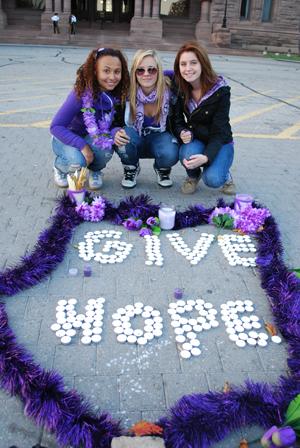Samantha Rogers, a sassy 15-year-old with long blonde hair and two lip-rings, says there are not nearly enough resources and supports for queer students in high school, especially those who fall victim to homophobic bullying and gender-based violence.
That’s why she was instrumental in creating the Facebook group Wear Purple to Commemorate the Suicides Caused by Homophobia.
At the Spirit Day Memorial at the entrance to Queen’s Park on Wednesday, Rogers is behind the megaphone, draped in a purple feather boa, leading the crowd in a chant, “If you’re straight, don’t hate.”
“I never learned about homophobia in school. I didn’t know what it was,” she says. “There’s no programs, no clubs, no nothing for gay youth at our school. It’s really sad. I guess that’s why there’s so many suicides.”
Rogers, a Pine Ridge Secondary School student in Pickering, expected a couple hundred people to join her group, so she was overwhelmed when more than 150,000 people clicked join.
About 45 purple-clad students, ranging in age from high school to university and college, plus a few adults who came to show solidarity, converge in front of the provincial legislature.
It doesn’t take long before Toronto Centre MPP Glen Murray and Nickel Belt NDP MPP France Gelinas come out to speak to organizers and offer their support.
Murray tells the students that when he was first elected as Winnipeg’s first openly gay mayor, some people had a problem, but today it’s the last thing people think about.
“We’re not talking to kids enough about suicides,” Murray tells Yasmin Neale, 20, who organized the memorial at Queen’s Park. “It’s about respect for young people and a celebration of young people, regardless of their sexuality or race.”
Neale asks Murray when schools will finally see the revised version of the 2010 Physical Education and Health Curriculum.
This month, Premier Dalton McGuinty tweeted a touching, albeit empty, message of support for bullied gay youth. The message stung some who are still reeling from McGuinty’s decision to shelve his government’s groundbreaking curriculum in April.
Murray says many smaller communities outside Toronto pushed back against the curriculum, demanding more consultation with parents.
“It’s a very big province, and some people have more concerns about those things than you or I would,” Murray tells Neale. “But we do believe it’s a very important document.”
Neale says the positive information in the curriculum about sexual health would have gone a long way to help fight homophobia and prevent bullying in schools.
Gelinas says sexual health education is needed most in smaller, rural communities, adding “Homophobia is alive and well in the north.”
“Absolutely. [The curriculum] could have helped in places that are having a tough time,” she says. “Kids would have had the tools to bring those discussions forward, have the discussions in an open forum, in a safe place like a classroom. It’s an opportunity missed.”
Javier Davila and Vladimir Vallecilla, who both work for the gender-based-violence prevention office at the Toronto District School Board, applaud the students for standing up against homophobic and transphobic violence by organizing a day of action.
Davila also takes aim at McGuinty, saying educators need the tools to talk to kids about sexual health.
“The curriculum would have seen age-appropriate sexual health education given to all students, yet it was thrown away at the whim of a couple extreme evangelical Christians,” he says. “That is something we need to implement in our school system now.
“It’s about basic respect for each other and basic human rights.”

 Why you can trust Xtra
Why you can trust Xtra


